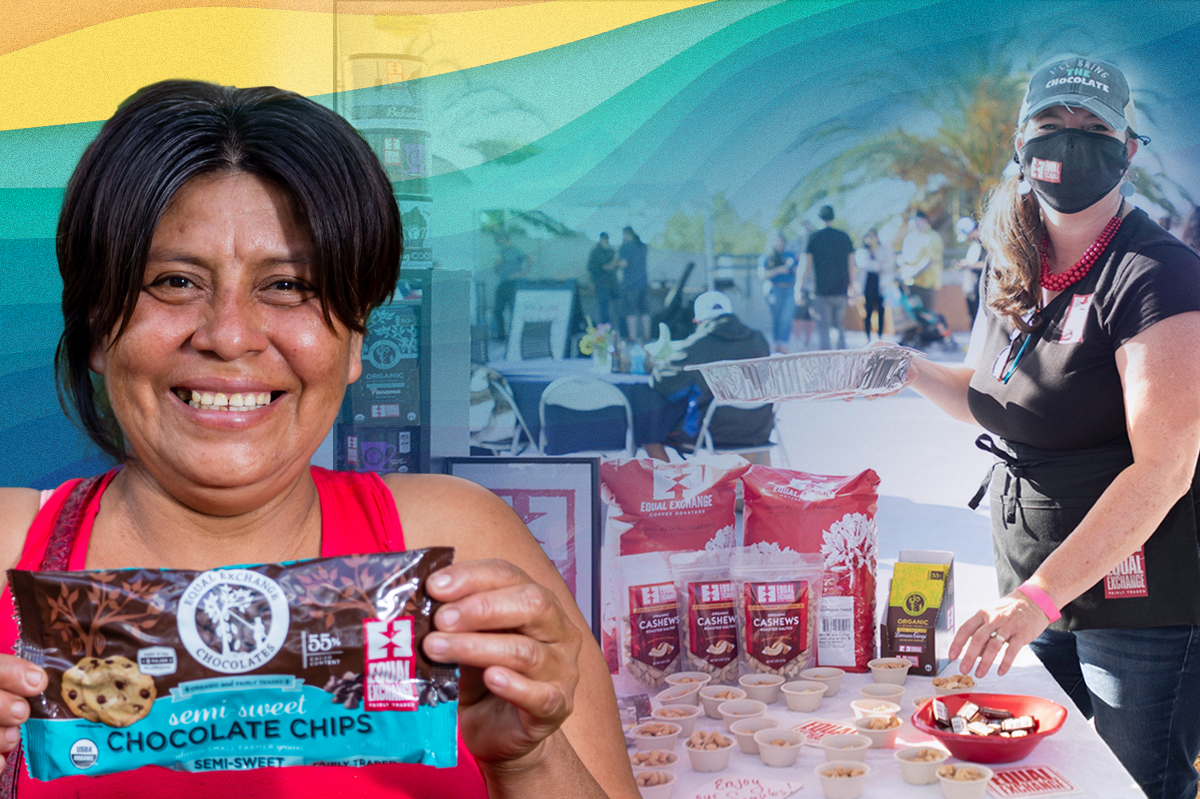Corporate Consolidation and Reconnecting with Your Food
Left: Joisy Tuanama Lumba, a member of the Huingoyacu community of ACOPAGRO co-op in Peru. Right: Lisa Landry of Equal Exchange at Sacramento Natural Foods Co-op’s Spring Fling Event.
Walking into a grocery store in January 2020 versus March 2020 was a vastly different experience.
As consumers, we are typically protected from realizing the harsh realities of our complex and unjust food system. Want an avocado that isn’t in season? No problem. A banana that is perfectly ripe? Easy. Milk at a retail price where dairy farmers are producing below cost and struggling to survive? Done. These products are typically waiting for us in perfect condition on the shelf and ready to be plopped into our shopping carts. Convenience is the goal, but what has been the cost?
Until the end of March 2020, most of us did not think much about the fragile and volatile food system that gets our food from origin to our dinner tables. But then, for the first time since many of us could remember, we walked into a store with a want or desire and the capitalist system could no longer oblige in the typical fashion of instant gratification, convenience, and low cost. In fact, over the past year, grocery prices have risen for consumers by 7.9%, farmers are making a mere 15 cents on the dollar, while major food companies have celebrated record-breaking profits. We stared at empty shelves, stood in long lines, masked, uncertain, and afraid of a world where we may run out of toilet paper.
Packing Crew preparing Equal Exchange Bananas to ship from AVACH cooperative in Peru.
What the crisis revealed
While even grocery retailers could not shield us from obvious food system woes, behind the scenes it was even worse. As consumers absorb higher food costs, farmers are overproducing and literally dumping milk, destroying eggs, and composting their produce. Input and production costs, transportation and distribution complexities due to the pandemic knocked the food system over like a set of dominoes. Bigger and more consolidated food systems create instability, volatility, and a lack of resilience and flexibility, especially in a crisis. Diverse, decentralized, and regionally focused local food systems were quick to adapt during the pandemic, they brought their products online, created food pick-up and delivery systems, and really embraced community-centered food systems. But is it enough?
Grocery giveaway in East Oakland in January 2021, hosted by the Deep Grocery Co-operative.
The illusion of choice
From a consumer’s perspective we are inundated with choice at the grocery store, we may stand for quite some time in an aisle making a “choice” but the reality is just a few brands control the majority of the food we buy at a store disguised under an “independent label”. Why does this matter? These major corporations increasingly control what we eat, how much we pay for our food, what farmers produce and what they get paid, and Big Food has big impacts on mother earth. Even worse, this kind of economic control has led to deep pockets to lobby with. Consolidation of our food system has led to laws, standards, and regulations that do not prioritize workers, consumers, farmers, or our planet.
Q: Which of these is not owned by Hain Celestial?
A: Trick question! All of these natural brands are owned by a single company: Hain Celestial.
So what can we do?
We need to take our power back, reconnect with our food. Collectively, we need to stay informed, connected, and active. We need to ensure that our consumer choices match our values, that we are participating in the right systems, supporting truly independent brands, and taking action whenever possible. If you have a food co-op in your area, consider joining. Support farmers directly by joining a CSA, get together with a friend or neighbor, and buy in bulk from independent food companies like Equal Exchange. Support organizations that are working toward real change in our food system with either your time or money. When you buy from Equal Exchange directly, you are opting out of the corporate food system. For the past 5 years, Equal Exchange has been organizing a vibrant community of citizen-consumers who care about our food system and making it better. We encourage you to join our network and be a part of a like-minded community working toward change. Connect with an Equal Exchange organizer and learn more.





